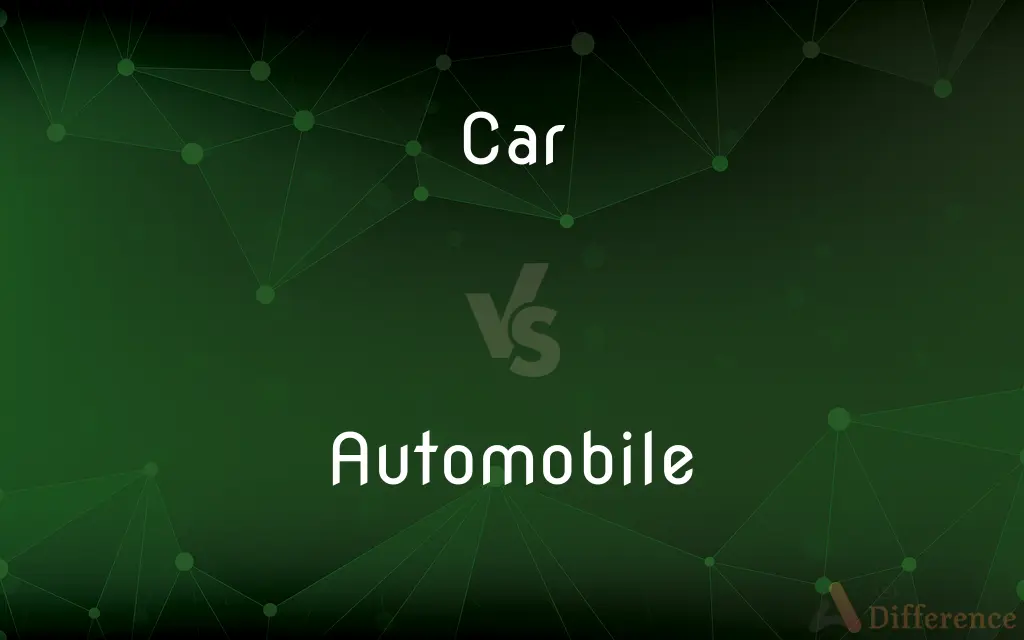Car vs. Automobile — What's the Difference?
By Urooj Arif & Maham Liaqat — Updated on February 28, 2024
A car and an automobile are terms used interchangeably to refer to wheeled motor vehicle used for transportation. While "car" is more commonly used in everyday language, "automobile" is a formal term that emphasizes the self-propelled nature of vehicle.

Difference Between Car and Automobile
Table of Contents
ADVERTISEMENT
Key Differences
The terms "car" and "automobile" both describe a motor vehicle with wheels designed primarily to transport people. "Car" is a shorter, more commonly used term that applies broadly to passenger vehicles of various sizes and shapes, including sedans, SUVs, and hatchbacks. It's used in everyday conversation and is recognized globally. "Automobile," on the other hand, is a more formal term that derives from a combination of Greek "autos" (self) and Latin "mobilis" (movable), highlighting the vehicle's capability to move independently without the need for rails or animal power.
The usage of "car" versus "automobile" can also reflect regional preferences. For instance, "car" is predominantly used in British and American English, while "automobile" might be found more frequently in formal writings, historical contexts, or when emphasizing the engineering aspect of the vehicle. Additionally, "automobile" can sometimes be seen in the names of professional associations or historical organizations, where the formal tone is preferred.
Both terms can encompass a wide range of passenger vehicles, including those powered by internal combustion engines, electric motors, or hybrid powertrains. The choice between "car" and "automobile" does not typically convey a difference in technology, functionality, or design. Instead, it more often reflects the speaker's preference or the context in which the term is used, with "car" being more colloquial and "automobile" sounding more formal or technical.
Despite these nuances, in most contexts, the terms are functionally equivalent. The evolution of language and the automotive industry has led to a situation where "car" is the more universally utilized term, especially in marketing, media, and everyday speech, due to its simplicity and ease of use. "Automobile," while still accurate and occasionally used, tends to evoke a sense of nostalgia or formality, or it appears in specific contexts where a more technical or historical tone is desired.
Comparison Chart
Definition
A wheeled motor vehicle for transporting people.
A self-propelled passenger vehicle on wheels.
ADVERTISEMENT
Usage
Common in everyday language.
More formal, used in technical or historical contexts.
Origin
Shortened form, easy to use.
Derived from Greek and Latin, highlighting self-propulsion.
Regional Preference
Widely used globally.
Used globally, with a preference for formal settings.
Contextual Use
Casual, marketing, media.
Formal writings, professional associations, historical references.
Compare with Definitions
Car
Common term for passenger vehicles.
She prefers a small car for city driving.
Automobile
Formal term for motor vehicles.
Automobile engineering is a specialized field.
Car
Applies to various types.
Electric cars are becoming more popular.
Automobile
A self-propelled passenger vehicle.
The museum's exhibit on early automobiles is fascinating.
Car
Used in everyday conversation.
How many cars can park here?
Automobile
Often found in professional contexts.
The Automobile Association provides roadside assistance.
Car
Short and colloquial term.
His new car is very fuel-efficient.
Automobile
Used in technical or historical texts.
The development of the automobile changed society.
Car
A vehicle for personal transport.
I drove my car to work today.
Automobile
Reflects innovation and independence.
Early automobiles were a luxury.
Car
A car (or automobile) is a wheeled motor vehicle used for transportation. Most definitions of cars say that they run primarily on roads, seat one to eight people, have four wheels, and mainly transport people rather than goods.Cars came into global use during the 20th century, and developed economies depend on them.
Automobile
Of or relating to automobiles; automotive.
Car
An automobile.
Automobile
A type of vehicle designed to move on the ground under its own stored power and intended to carry a driver, a small number of additional passengers, and a very limited amount of other load. A car or motorcar.
Car
A vehicle, such as a streetcar, that runs on rails
A railroad car.
Automobile
To travel by automobile.
Car
A wheeled vehicle that moves independently, with at least three wheels, powered mechanically, steered by a driver and mostly for personal transportation.
She drove her car to the mall.
Automobile
A self-propelled vehicle used for transporting passengers, suitable for use on a street or roadway. Many diferent models of automobiles have beenbuilt and sold commercially, possessing varied features such as a retractable roof (in a convertible), different braking systems, different propulsion systems, and varied styling. Most models have four wheels but some have been built with three wheels. Automobiles are usually propelled by internal combustion engines (using volatile inflammable liquids, as gasoline or petrol, alcohol, naphtha, etc.), and sometimes by steam engines, or electric motors. The power of the driving motor varies from under 50 H. P. for earlier models to over 200 H. P. larger models or high-performance sports or racing cars. An automobile is commonly called a car or an auto, and generally in British usage, motor cars.
Car
(dated) A wheeled vehicle, drawn by a horse or other animal; a chariot.
Automobile
To travel in an automobile.
Car
A four-wheeled cab, as opposed to a (two-wheeled) Hansom cab.
Car
(rail transport) an individual vehicle, powered or unpowered, in a multiple unit.
The 11:10 to London was operated by a 4-car diesel multiple unit.
Car
The passenger-carrying portion of certain amusement park rides, such as Ferris wheels.
The most exciting part of riding a Ferris wheel is when your car goes over the top.
Car
A small vehicle moved on wheels; usually, one having but two wheels and drawn by one horse; a cart.
Car
4-wheeled motor vehicle; usually propelled by an internal combustion engine;
He needs a car to get to work
Common Curiosities
Why is "car" more commonly used than "automobile"?
"Car" is shorter, simpler, and fits more easily into everyday conversation and language.
Can the term "automobile" refer to trucks or buses?
Generally, "automobile" refers to passenger vehicles, not commercial vehicles like trucks or buses.
Are car and automobile exactly the same?
Yes, both terms refer to motor vehicles for personal transport, though "automobile" is more formal.
Do professionals in the automotive industry prefer one term over the other?
Professionals might use both, but "car" is more common in marketing and consumer-related contexts, while "automobile" might be used in formal or technical discussions.
Does the choice between "car" and "automobile" affect communication?
The choice can reflect the formality of the context but typically does not hinder understanding due to their synonymous meanings.
Are there any contexts where "automobile" is preferred?
Yes, in formal writings, historical discussions, and within the names of certain professional organizations.
Can the use of "car" or "automobile" influence public perception?
Yes, "automobile" might evoke a sense of sophistication or nostalgia, while "car" is more neutral and contemporary.
Is "automobile" considered outdated?
While not outdated, "automobile" is more formal and less commonly used in casual speech today.
How has the usage of these terms evolved?
"Car" has become the dominant term in everyday language, while "automobile" retains a formal, classic appeal.
Is one term more accurate than the other?
Both terms accurately describe passenger vehicles, with no inherent difference in accuracy.
How do new vehicle technologies affect the use of these terms?
Technological advances in vehicles do not fundamentally change the use of these terms, as both adapt to include new types of passenger vehicles.
Do these terms have different implications in insurance or legal contexts?
In legal and insurance contexts, both terms are understood but documentation may prefer "automobile" for its formality.
Why might someone choose to use "automobile" over "car"?
Preference for "automobile" might stem from a desire for formality, specificity, or historical context.
Are there any significant differences in how these terms are used internationally?
Usage can vary by region, with "car" being universally recognized, while "automobile" may be preferred in formal or academic contexts internationally.
Will the term "automobile" become obsolete?
While its usage may decline in favor of "car," "automobile" is unlikely to become obsolete due to its formal and historical significance.
Share Your Discovery

Previous Comparison
Paise vs. Paisa
Next Comparison
Graphics vs. AnimationAuthor Spotlight
Written by
Urooj ArifUrooj is a skilled content writer at Ask Difference, known for her exceptional ability to simplify complex topics into engaging and informative content. With a passion for research and a flair for clear, concise writing, she consistently delivers articles that resonate with our diverse audience.
Co-written by
Maham Liaqat













































